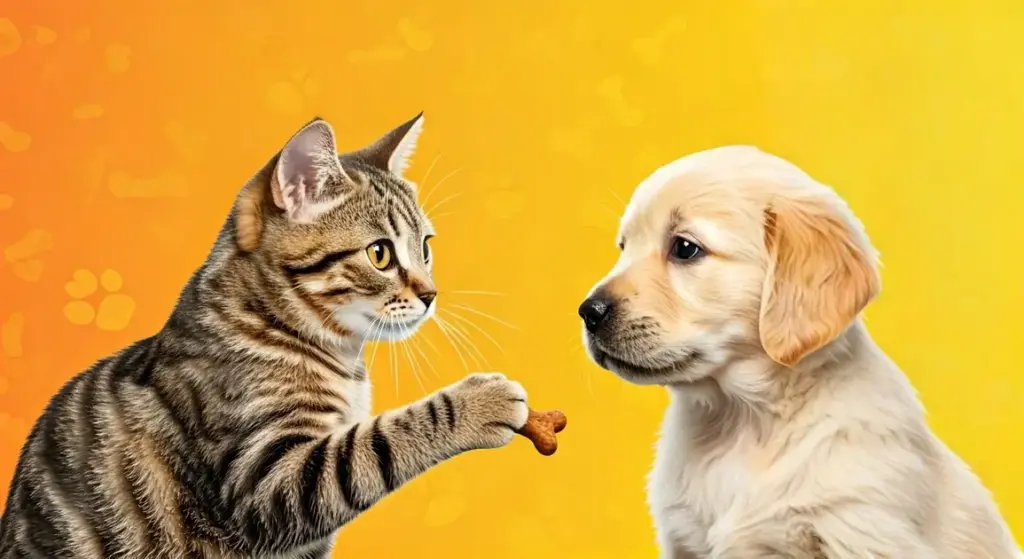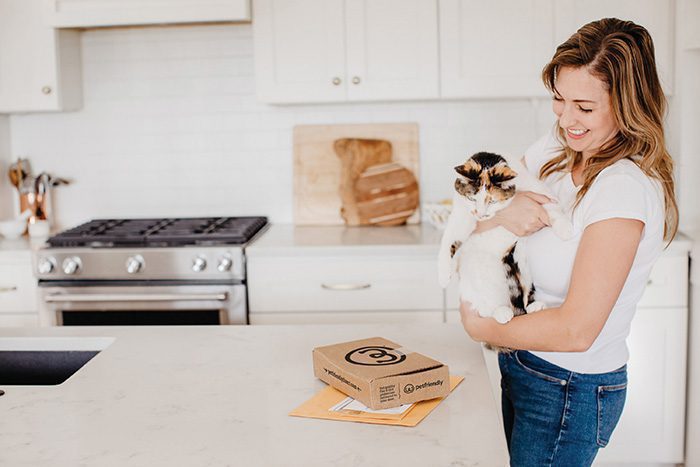Cats are naturally carnivores, and their nutritional requirements differ significantly from those of dogs, making the question of whether cats eat dog food a topic of great importance to pet owners.
While occasional consumption of dog food may not cause immediate harm, feeding cats a diet consisting primarily of dog food can lead to serious health problems, including nutrient deficiencies, obesity, and gastrointestinal issues.
The differences between the nutritional needs of cats and dogs highlight why understanding the effects of feeding between species is crucial.
The primary risks associated with letting cats eat dog food stem from its inadequate nutritional profile for cats. Dog food often lacks essential vitamins, minerals, and amino acids vital for cat health, such as taurine and arachidonic acid. This deficiency can result in long-term health consequences, including urinary tract disease, muscle wasting, and even blindness.
Furthermore, the higher carbohydrate content and lower protein levels of dog food can contribute to obesity and other metabolic problems in cats, reflecting a mismatch with their evolved dietary preferences.
Behavioral issues can also arise when cats eat dog food, as their notoriously picky eating habits may be disrupted. Regular consumption of dog food can foster food aversions or alter eating patterns, making it difficult to reintroduce a proper feline diet.
Veterinary professionals emphasize the importance of species-specific diets and recommend keeping dog food out of reach of cats to prevent dietary errors and maintain optimal health for both pets.
In short, while cats may occasionally eat dog food out of curiosity or hunger, pet owners should be aware of the potential risks and prioritize their cats’ unique nutritional needs to ensure long-term health and well-being.
Nutritional Requirements for Cats
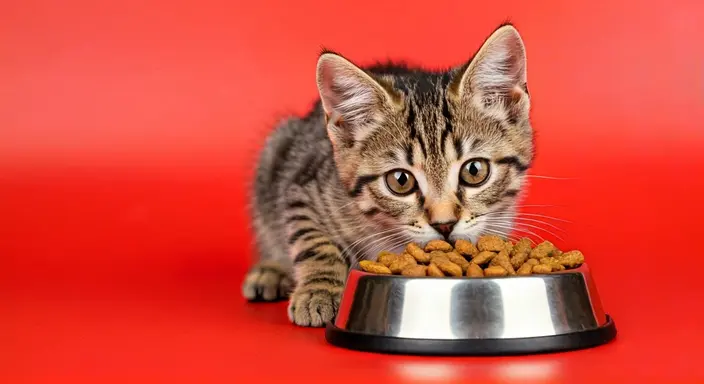
Cats are carnivores, which means their nutritional needs are met primarily through animal products. Their evolution as hunters has shaped their nutritional requirements to include high amounts of protein, moderate fat, and minimal carbohydrates.
This section explores the essential nutrients that contribute to cat health and how they differ from those needed by other species, such as dogs.
Protein
Dietary protein is essential for cats as it provides the vital amino acids required for producing antibodies, enzymes, hormones, and tissues, while also helping to maintain proper pH balance.
Complete proteins, which include all essential amino acids, are primarily found in animal sources like meat, fish, eggs, and poultry. In contrast, many plant proteins are considered incomplete because they do not offer all the essential amino acids that cats need, such as taurine.
Due to their high protein requirements, a cat’s dietary protein needs can vary based on factors such as age, activity level, and the digestibility of the protein source.
Fats and Fatty Acids
Fats serve as a concentrated source of energy and are essential for the absorption and utilization of certain nutrients. In cats, specific fatty acids such as linoleic acid, arachidonic acid, and docosahexaenoic acid (DHA) are essential for health.
Unlike dogs, which can synthesize arachidonic acid from other dietary fats, cats must obtain it directly from their food.
Diets designed for cats often include these essential fatty acids to support their metabolic functions and overall health.
Carbohydrates
Although cats can digest some carbohydrates, their ability to use them as an energy source is limited compared to dogs. Cats rely primarily on protein for energy, and eating too much carbohydrate can lead to health problems such as obesity and diabetes.
Therefore, formulating cat food typically involves careful consideration of carbohydrate levels to match their metabolic needs.
Vitamins and Minerals
Vitamins and minerals are micronutrients that play important roles in many physiological functions in cats. These include regulation of metabolism, bone growth, and nervous system function.
Essential vitamins such as B-complex vitamins and minerals such as calcium, phosphorus, and magnesium are essential for maintaining overall health.
Moreover, minerals work synergistically, enhancing the bioavailability and effectiveness of vitamins.
Risks of Feeding Cats Dog Food
Feeding cats dog food can lead to various health problems due to the significant differences in their nutritional needs. Unlike dogs, cats are obligate carnivores, meaning they require a diet high in animal protein and certain nutrients that dog food does not provide adequately.
Regularly feeding cats dog food can result in nutrient deficiencies, weight gain, digestive issues, and other serious health concerns.
Nutritional Deficiencies
One of the primary risks of feeding cats dog food is the potential for nutritional deficiencies. Dog food is formulated to meet the nutritional requirements of dogs, which differ from those of cats.
Consequently, dog food may lack essential vitamins, minerals, and nutrients vital for cat health, such as taurine, arachidonic acid, and certain B vitamins.
Over time, these deficiencies can lead to severe health issues, including urinary tract disease, muscle wasting, and even blindness.
Weight Gain and Obesity
Another concern is that dog food often contains higher levels of carbohydrates and lower levels of protein than cat food. This imbalance can contribute to obesity in cats, which is linked to a host of additional health problems, including diabetes and joint problems.
In addition, a lack of adequate fat content in dog food can lead to weight loss and other health complications if fed exclusively.
Digestive Problems
Cats have sensitive digestive systems that adapt to high-protein diets. Feeding them dog food can upset their digestive system, leading to symptoms such as vomiting, diarrhea, and constipation.
Ingredients in dog food, such as grains and carbohydrates, may not be easily digested by cats and can disrupt their digestive health.
Fooding dogs over the long term can exacerbate these issues, potentially leading to chronic digestive conditions.
Behavioral Problems
Feeding cats dog food can also create behavioral problems. Cats are often picky eaters and may develop picky eating habits or food aversions if they become accustomed to dog food. This can lead to further nutritional imbalances as cats may refuse to eat their regular cat food.
Pet behaviorists emphasize the importance of providing a diet that matches the specific tastes and nutritional needs of cats to prevent these problems.
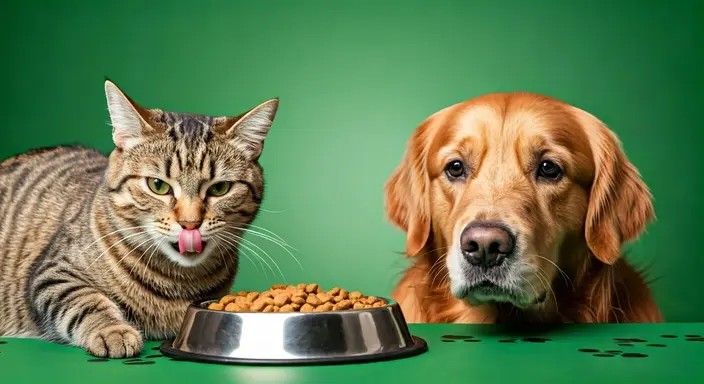
Dog Food vs Cat Food
Nutritional Differences
The nutritional requirements of cats and dogs differ significantly, which is reflected in the composition of their foods.
Cats are carnivores, meaning their diet should be rich in animal proteins, while dogs are facultative carnivores and can thrive on a more varied diet that includes both plant and animal sources.
As such, cat food typically contains higher levels of protein and fat than dog food, which is crucial to meeting the nutritional needs of cats.
Protein and Fat Content
The protein content of cat food is generally higher than that of dog food, meeting cats’ need for animal proteins to maintain health and energy.
Cats also require more fat in their diet, which contributes to their overall energy intake and supports bodily functions. Conversely, while dogs can eat a lower protein diet, they benefit from a combination of animal and plant proteins.
Additional Nutrients
Other vital differences between cat and dog food include essential nutrients such as vitamin A, taurine, and arachidonic acid, which are essential for cats but not for dogs.
Taurine, in particular, is an amino acid that cats must obtain from their diet, whereas dogs can synthesize it on their own.
As such, diets designed for dogs lack adequate amounts of these nutrients, which can lead to serious health problems if a cat is fed dog food for an extended period.
Digestive Differences
The digestive systems of cats and dogs illustrate why feeding cats and dog food is insufficient.
Cats have evolved to efficiently process diets high in protein and fat, whereas dogs have a more flexible digestive system that can handle a variety of food types, including those higher in carbohydrates.
This difference explains why cats get sick after eating dog food, as the higher levels of protein and fat in cat food can cause digestive upset in dogs.
Health Effects of Long-Term Feeding
Feeding cats exclusively dog food for a long period can lead to serious health consequences, including malnutrition and organ damage due to a lack of essential nutrients.
Similarly, while a dog may occasionally consume cat food without immediate harm, regular consumption can lead to obesity and digestive problems, as their bodies are not designed to handle the richer nutrient profile of cat food.
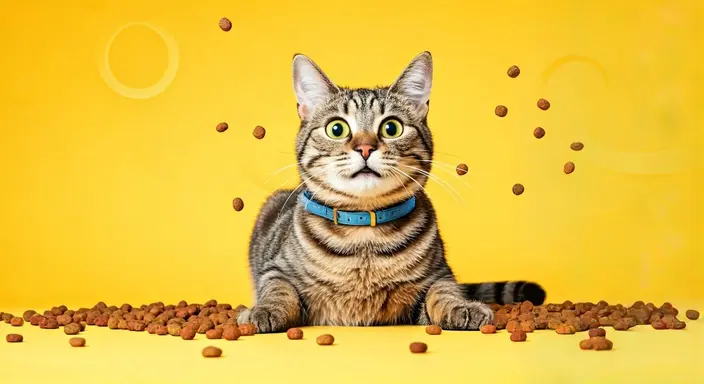
Situations Where Cats Might Eat Dog Food
Cats may find themselves eating dog food under various circumstances, primarily driven by curiosity or hunger. This behavior can be attributed to several factors, including the allure of new flavors and the competitive dynamics between pets in a shared environment.
Curiosity and Exploration
Cats are naturally inquisitive creatures, often motivated by the scent of food. The strong aromas emanating from a dog’s meal can attract a cat’s attention, prompting them to sample what their canine counterpart is eating.
This behavior is commonly observed in households with both cats and dogs, where cats may venture into the dog’s bowl out of sheer curiosity or boredom with their food.
Hunger and Nutritional Needs
A cat might also resort to eating dog food if it is feeling hungry or if its food is insufficient or unappealing. If a cat’s diet lacks certain essential nutrients, such as adequate protein or fat, it may seek alternative sources of sustenance, leading it to the dog’s bowl.
While the occasional nibble of dog food may not pose an immediate health risk, a regular diet of dog food can result in serious nutritional deficiencies over time.
Behavioral Factors
Feeding dynamics can also play a role in why cats eat dog food. In some cases, cats may develop food aversion or picky eating habits if they frequently consume dog food.
This could lead to an imbalanced diet and health issues due to the lack of tailored nutrients that meet a cat’s specific dietary needs.
Additionally, a cat may be drawn to the texture or variety of dog food, which might appear more enticing compared to their usual meals.
Environmental Factors
To minimize the likelihood of a cat eating dog food, pet owners are advised to feed their pets in separate areas or at different times.
By keeping the dog food out of the cat’s reach, owners can help ensure that each pet maintains a diet suited to their nutritional requirements.
This approach not only helps prevent dietary indiscretion but also fosters a healthier eating environment for both pets.
Expert Opinions and Guidelines
Veterinarians and pet nutritionists emphasize the importance of species-specific diets for optimal pet health. Cats and dogs have very different nutritional requirements; for example, cats require more protein and some essential nutrients than dogs do.
Feeding cats and dog food can lead to nutrient deficiencies and long-term health problems, highlighting the need for owners to be mindful of their pets’ specific nutritional needs.
Dietary Recommendations
When recommending diets, veterinarians aim to provide the best possible nutritional choices that clients are willing and able to implement.
If a client is hesitant to follow a veterinarian-recommended diet, practitioners may work to suggest alternative feeding strategies that are viable and beneficial to the pet’s health.
Owners should understand the implications of feeding their pets inappropriate diets, as the wrong food can lead to serious health complications over time.
The Importance of Quality Control
Choosing a commercial pet food requires careful consideration of quality control standards among manufacturers. It is essential to look for foods from companies that adhere to strict quality measures, such as certification procedures and comprehensive testing for nutrient content and pathogens.
Owners should inquire about the nutritional analysis provided by manufacturers, which should ideally reflect the exact nutritional values rather than the guaranteed minimum as stated on the labels.
Counseling and Education
To ensure a balanced diet, pet owners are advised to consult with veterinary professionals or certified veterinary nutritionists, especially when considering home-prepared or raw meat-based diets.
Resources such as the World Small Animal Veterinary Association’s Nutrition Toolkit can provide valuable guidance on choosing the right pet food.
By prioritizing education about proper nutrition and recognizing the unique nutritional needs of both species, pet owners can promote healthier, happier lives for their feline and canine companions.


